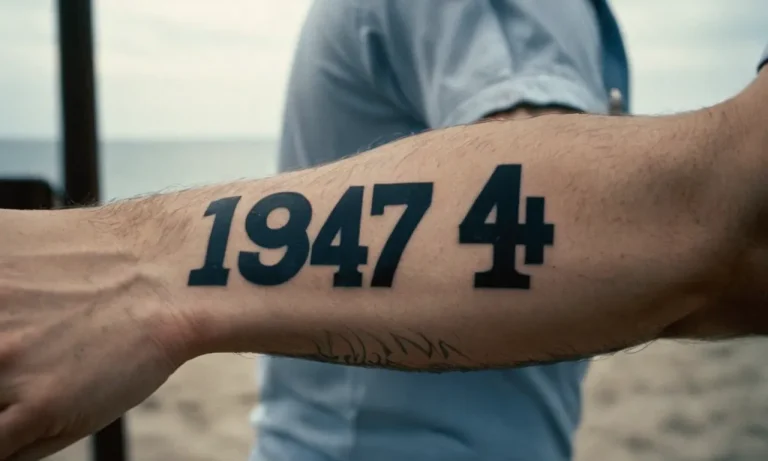Tgif Meaning: A Comprehensive Guide To Understanding This Popular Acronym
Are you tired of feeling left out when your friends or colleagues casually drop the acronym ‘TGIF’? Don’t worry, you’re not alone. This widely used phrase has become a cultural phenomenon, but its meaning might not be immediately apparent to everyone.
If you’re short on time, here’s a quick answer to your question: TGIF stands for ‘Thank God It’s Friday,’ a popular expression used to celebrate the arrival of the weekend and the end of the workweek.
In this comprehensive article, we’ll dive deep into the origins, usage, and cultural significance of TGIF. We’ll explore its evolution from a simple phrase to a global phenomenon, and how it has become ingrained in our everyday language.
Whether you’re a curious individual or a language enthusiast, this guide will provide you with a thorough understanding of this ubiquitous acronym.
The Origins of TGIF
The Birth of the Phrase
The phrase “TGIF” is an acronym that stands for “Thank God It’s Friday.” Its origins can be traced back to the mid-20th century when it emerged as a popular expression among workers in the United States.
After a long week of toiling at the office or factory, Friday signaled the end of the workweek and the beginning of a well-deserved weekend. The phrase was a way for employees to celebrate the arrival of their time off, a sentiment that resonated with people across various industries and professions.
Early Usage and Popularity
While the exact origin of the phrase is unclear, some sources suggest that it gained widespread popularity in the 1960s and 1970s. During this period, the phrase began appearing in popular culture, such as in advertisements, TV shows, and movies.
One of the earliest documented uses of the phrase can be found in a 1966 issue of the Miami News, where it was used in a beer advertisement. As the phrase gained traction, it became a common expression used by people from all walks of life to express their relief and excitement for the impending weekend.
Cultural Significance in the 20th Century
TGIF quickly became ingrained in the cultural fabric of the United States and beyond. It was a phrase that transcended social and economic boundaries, resonating with everyone from blue-collar workers to white-collar professionals.
The phrase embodied the universal desire for leisure time and a break from the daily grind. In the latter half of the 20th century, the phrase took on even greater significance as the concept of the weekend became more deeply rooted in society.
According to data from the Bureau of Labor Statistics, the number of workers employed on weekends in the United States has steadily increased over the past few decades. However, the weekend still holds a special place in the hearts of many, and the phrase TGIF remains a popular way to express that sentiment.
Whether it’s uttered in the office, shared on social media (with a celebratory 🎉 emoji), or used in marketing campaigns, TGIF continues to be a widely recognized and beloved acronym that encapsulates the joy and relief of the weekend.
TGIF in Modern Times
The Rise of Social Media and Meme Culture
In the age of social media and internet memes, TGIF has found a new lease on life. The acronym has become a popular way for people to express their excitement for the weekend on various platforms like Twitter, Facebook, and Instagram.
It’s not uncommon to see a flood of TGIF posts every Friday, accompanied by celebratory emojis and GIFs. 😎🎉 This surge in popularity can be attributed to the rise of meme culture, where catchy phrases and inside jokes spread like wildfire across the internet.
According to a Statista report, there were 4.66 billion active internet users worldwide as of January 2021, with social media platforms being a major driving force behind the spread of memes and viral content.
The ease of sharing and engaging with content on these platforms has contributed to the widespread adoption of TGIF as a way to celebrate the end of the workweek. 🙌
Corporate Branding and Marketing Strategies
Recognizing the popularity of TGIF, many companies have incorporated the acronym into their branding and marketing strategies. From restaurants offering TGIF specials to retail stores launching TGIF sales, businesses have found creative ways to capitalize on the weekend excitement.
Some companies have even gone as far as creating TGIF-themed merchandise, such as t-shirts and mugs, catering to the growing demand for TGIF-related products.
A study by Marketing Charts revealed that over 90% of marketers leverage social media for brand awareness and content marketing. By tapping into the TGIF trend, businesses can connect with their target audience on a more personal level, fostering a sense of relatability and camaraderie.
After all, who doesn’t love a good TGIF celebration? 🍻
TGIF as a Global Phenomenon
While TGIF originated in the United States, its reach has extended far beyond borders. The acronym has transcended language barriers and cultural differences, becoming a universal symbol of weekend joy and relaxation.
From Europe to Asia, TGIF has found its way into the lexicon of people around the world, proving that the desire to unwind after a long week of work is a shared human experience.
According to a Statista report, the top five countries with the highest number of Facebook users are India, the United States, Indonesia, Brazil, and Mexico. This global reach of social media platforms has undoubtedly contributed to the widespread adoption of TGIF, allowing people from different cultures to connect and celebrate the weekend together.
🌍
The Psychology Behind TGIF
Work-Life Balance and the Importance of Weekends
In today’s fast-paced world, achieving a healthy work-life balance can be a challenge. The weekends provide a much-needed respite from the demands of the workplace, allowing individuals to recharge and engage in activities that bring them joy and fulfillment.
According to a study by the American Psychological Association, 58% of employees reported feeling better able to manage their stress levels when they had sufficient time for leisure activities. The anticipation of the weekend and the freedom it brings can be a powerful motivator for many to push through the work week.
The Anticipation of Leisure and Relaxation
The excitement and anticipation leading up to the weekend can be just as powerful as the weekend itself. As the work week progresses, the thought of having two days off to pursue personal interests, spend time with loved ones, or simply relax can provide a sense of hope and motivation.
This anticipation can be a coping mechanism for dealing with the stresses and demands of the work week. A study by Psychology Today found that anticipating positive events can release dopamine in the brain, which is associated with feelings of pleasure and reward. 😊
TGIF as a Coping Mechanism for Stress
For many individuals, the work week can be a source of significant stress and burnout. The phrase “TGIF” serves as a lighthearted reminder that the weekend is just around the corner, offering a temporary escape from the pressures of the workplace.
According to a survey by Gallup, 23% of employees reported feeling burned out at work “very often” or “always”. The excitement and relief associated with TGIF can be a powerful coping mechanism for managing work-related stress.
By focusing on the upcoming weekend, individuals can find the motivation to push through the final days of the work week, knowing that a well-deserved break is just around the corner. 👏
TGIF in Popular Culture
The acronym “TGIF” has become a ubiquitous part of popular culture, transcending its original meaning of “Thank God It’s Friday” to represent a celebratory attitude towards the end of the workweek. Its widespread usage in various forms of media has solidified its place in the cultural lexicon.
Movies, TV Shows, and Music References
TGIF has made numerous appearances in movies, TV shows, and music. The iconic 1970s sitcom “TGIF” featured a lineup of family-friendly shows airing on Friday nights on ABC, including “Full House,” “Family Matters,” and “Step by Step.”
This programming block became a cultural phenomenon, with families gathering around the TV to enjoy their favorite shows. In the movie “Office Space”, the character Peter Gibbons famously utters the line “Whoa, hey, heyyyy…it’s TGIF, man!” capturing the joy and relief of the weekend’s arrival.
Music artists like Katy Perry and Ke$ha have also incorporated the phrase into their songs, further cementing its place in pop culture.
Social Media Trends and Hashtags
In the age of social media, TGIF has taken on a new life as a popular hashtag. On platforms like Twitter, Instagram, and Facebook, users enthusiastically share their weekend plans and celebrate the end of the workweek using #TGIF.
According to Social Media Today, #TGIF is one of the most popular hashtag holidays, with millions of posts shared every Friday. Brands and businesses have also capitalized on this trend, using TGIF-themed campaigns and promotions to engage with their audiences.
TGIF-Themed Events and Celebrations
The spirit of TGIF has extended beyond the digital realm and manifested in various events and celebrations. Many bars, restaurants, and nightclubs host TGIF parties, offering special deals and themed activities to kick off the weekend.
Office parties and team-building events often incorporate a TGIF theme, allowing coworkers to unwind and enjoy each other’s company outside of the typical work environment. Some cities even organize TGIF street festivals or block parties, where local businesses and vendors come together to create a festive atmosphere for the community to celebrate the arrival of the weekend.
Whether it’s through movies, TV shows, music, social media, or real-world events, the phrase “TGIF” has become a cultural phenomenon that resonates with people across generations. It encapsulates the collective joy and anticipation felt as the workweek comes to an end, offering a chance to recharge and enjoy leisure time.
As long as people continue to look forward to the weekend, the enduring popularity of TGIF in popular culture is sure to persist.
Alternative Meanings and Variations
Regional and Cultural Variations
While “TGIF” is widely recognized as an acronym for “Thank God It’s Friday,” its meaning can vary across different regions and cultures. In some parts of the world, it takes on a slightly different interpretation.
For instance, in certain Spanish-speaking countries, “TGIF” is sometimes used to mean “Tan Guay Ir de Fiesta” (So Cool to Go Party), reflecting the excitement for weekend festivities Source: Urban Dictionary.
Humorous and Sarcastic Interpretations
Over time, “TGIF” has also been humorously reinterpreted in various ways. Some playful variations include “Thank Goodness It’s Friday,” “That Grind Is Finished,” or even “Time to Get Incredibly Funky” (for those with weekend dance moves 💃).
In certain circles, it’s also been sarcastically interpreted as “This Grind Is Forever,” expressing the never-ending cycle of work and stress. These humorous and sarcastic takes on “TGIF” reflect the diverse ways people relate to the end of the workweek Source: Dictionary.com.
TGIF in Different Languages and Contexts
While “TGIF” is an English acronym, its sentiment has transcended linguistic boundaries. In various languages, similar phrases or acronyms are used to express the same relief and anticipation for the weekend. For example, in German, “Endlich Wochenende” (Finally Weekend) captures the spirit of TGIF.
In French, “Enfin le week-end” (Finally the Weekend) is a common expression. Even in languages like Arabic and Hindi, there are idiomatic phrases that convey the joy of the approaching weekend Source: ViralCovert.
Beyond personal contexts, “TGIF” has also found its way into business and marketing strategies. Many restaurants, bars, and entertainment venues offer special “TGIF” promotions or events to cater to the weekend crowd.
Some companies even use the acronym in internal communications to boost employee morale and celebrate the end of the workweek. In these contexts, “TGIF” serves as a unifying symbol of shared relief and excitement for the weekend ahead 🎉.
Conclusion
TGIF has undoubtedly become a cultural phenomenon, transcending its humble beginnings as a simple phrase. Its widespread usage and adaptability have made it a part of our everyday language, reflecting our collective desire for leisure and relaxation after a long workweek.
Whether you’re a seasoned TGIF enthusiast or a newcomer to this acronym, this comprehensive guide has provided you with a deep understanding of its origins, evolution, and cultural significance. From its psychological underpinnings to its manifestations in popular culture, TGIF has proven to be a versatile and enduring expression that resonates with people across the globe.
So, the next time you hear someone exclaim ‘TGIF,’ you’ll not only understand its meaning but also appreciate the rich history and cultural context behind this simple yet powerful acronym. Embrace the weekend spirit, and join the millions who celebrate the arrival of Friday with a heartfelt ‘Thank God It’s Friday!’








